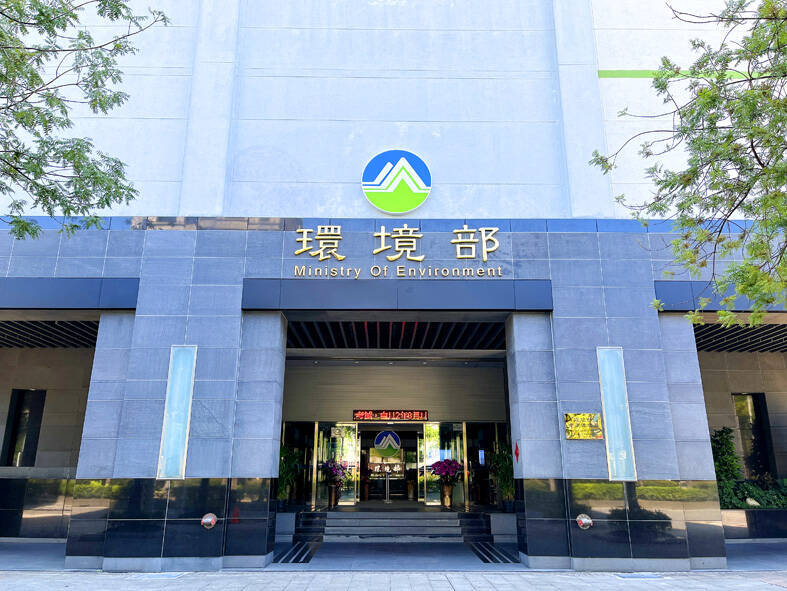Plastic bottles topped the list of most common marine waste in Taiwan for the fifth consecutive year, the Ministry of Environment has said.
The ministry on Tuesday last week released its latest report on the maintenance and management of the coastal environment, which analyzed the composition of the nation’s marine waste based on the investigation results of International Coastal Cleanup, the largest volunteer effort to clean up the world’s beaches and waterways, from the first to third quarter of last year.
The report showed that 29.8 percent of marine waste was plastic bottles, which topped the list for five years in a row.

Photo: Chen Chia-yi, Taipei Times
The second most common marine waste was plastic bottle caps, accounting for 12.8 percent, followed by glass bottles at 10.2 percent, cigarette butts at 7.5 percent, and plastic straws at 4.5 percent, it said, adding that cigarette butts ranked among the top five for the first time.
The ministry cited a report from the Ocean Conservancy that compared Taiwan’s coastal waste to global marine litter.
Plastic bottles from Taiwan made up about 3 percent of the world’s plastic bottle marine waste, while plastic bottle caps were 2.8 percent of the world’s and plastic straws were 1.9 percent, it said.
The proportions of the three items to total marine waste in Taiwan were big compared with the world average of 1.2 percent, the report added.
A plastic reduction subsidy scheme would be launched next year to incentivize the hospitality industry to cut down bottled water use, the ministry’s Resource Circulation Administration Director Lai Ying-ying (賴瑩瑩) said yesterday.
Hotel operators could apply for a subsidy to implement plastic-reduction measures, Lai said, adding that they should not provide plastic-bottled water in at least half of their rooms.
The government would also subsidize the installation of refilling systems for glass-bottled water to facilitate the recycling, cleanup and refilling of glass bottles for the industry, she said.
To reduce bottle cap waste and encourage green product designs, a preferential subsidy on recycling and disposal would be given to bottled water manufacturers who use caps attached to bottles, she said.
Event organizers are advised to use reusable cups to reduce litter from plastic bottles and caps, she added.
Environmental Management Administration Director-General Yen Hsu-ming (顏旭明) yesterday said the government would clamp down on littered cigarette butts.
Cigarette butts as maritime waste do not necessarily come from coastal areas, he said, adding that a big part of such marine waste is caused by people who discard cigarette butts on roads or into drainages.
When it rains, cigarette butts would flow into the sewer system and finally into the ocean, he added.

Taiwan is to commence mass production of the Tien Kung (天弓, “Sky Bow”) III, IV and V missiles by the second quarter of this year if the legislature approves the government’s NT$1.25 trillion (US$39.78 billion) special defense budget, an official said yesterday. Commenting on condition of anonymity, a defense official with knowledge of the matter said that the advanced systems are expected to provide crucial capabilities against ballistic and cruise missiles for the proposed “T-Dome,” an advanced, multi-layered air defense network. The Tien Kung III is an air defense missile with a maximum interception altitude of 35km. The Tien Kung IV and V

The disruption of 941 flights in and out of Taiwan due to China’s large-scale military exercises was no accident, but rather the result of a “quasi-blockade” used to simulate creating the air and sea routes needed for an amphibious landing, a military expert said. The disruptions occurred on Tuesday and lasted about 10 hours as China conducted live-fire drills in the Taiwan Strait. The Civil Aviation Administration (CAA) said the exercises affected 857 international flights and 84 domestic flights, affecting more than 100,000 travelers. Su Tzu-yun (蘇紫雲), a research fellow at the government-sponsored Institute for National Defense and Security Research, said the air

Taiwan lacks effective and cost-efficient armaments to intercept rockets, making the planned “T-Dome” interception system necessary, two experts said on Tuesday. The concerns were raised after China’s military fired two waves of rockets during live-fire drills around Taiwan on Tuesday, part of two-day exercises code-named “Justice Mission 2025.” The first wave involved 17 rockets launched at 9am from Pingtan in China’s Fujian Province, according to Lieutenant General Hsieh Jih-sheng (謝日升) of the Office of the Deputy Chief of the General Staff for Intelligence at the Ministry of National Defense. Those rockets landed 70 nautical miles (129.6km) northeast of Keelung without flying over Taiwan,

A strong continental cold air mass is to bring pollutants to Taiwan from tomorrow, the Ministry of Environment said today, as it issued an “orange” air quality alert for most of the country. All of Taiwan except for Hualien and Taitung counties is to be under an “orange” air quality alert tomorrow, indicating air quality that is unhealthy for sensitive groups. In China, areas from Shandong to Shanghai have been enveloped in haze since Saturday, the ministry said in a news release. Yesterday, hourly concentrations of PM2.5 in these areas ranged from 65 to 160 micrograms per cubic meter (mg/m³), and pollutants were